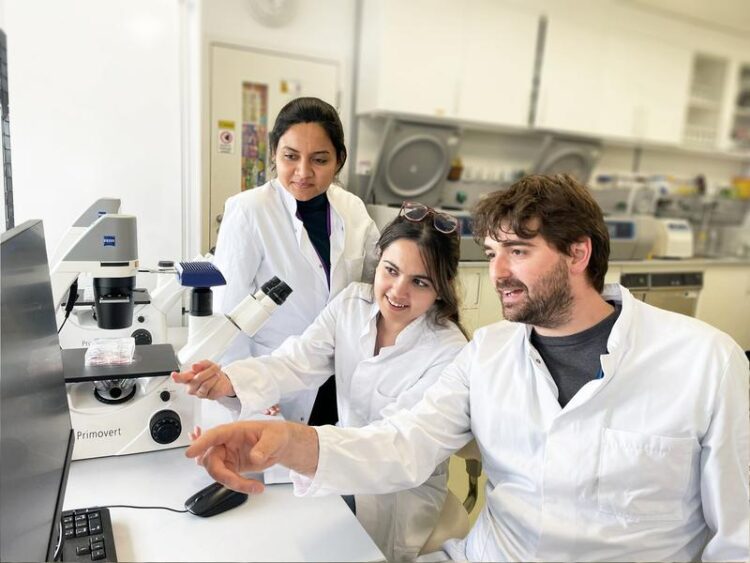On the trail of blood cancer

Researching epigenetic changes as a cause of leukaemia in old age: Dr Florian Perner.
Copyright: Karin Kaiser / MHH
MHH haematologist Dr Florian Perner has been awarded 2.2 million euros from the Emmy Noether Programme of the German Research Foundation (DFG) for his research into epigenetic changes in blood stem cells and their role in the development of blood cancer.
Leukocytes – colloquially known as white blood cells – protect us from pathogens and tumour cells. While their proliferation and renewal is normally strictly regulated, this process gets out of control in some people: the immature precursors of the leukocytes in the bone marrow multiply disproportionately at the expense of mature blood cells – and blood cancer develops. The risk of leukaemia and other forms of blood cancer increases with age, while the prognosis for those affected worsens and relapses and resistance to the drugs used increase. Treatments such as chemotherapy or stem cell transplants are also difficult because they are poorly tolerated by older people.
Genetic changes in haemotopoietic stem cells do not necessarily lead to the development of blood cancer in all people. Dr Florian Perner, a scientist at the Department of Haematology, Haemostaseology, Oncology and Stem Cell Transplantation at Hannover Medical School (MHH), is investigating why this is the case and how the biological processes work. He wants to find a way to specifically influence the malignant properties of blood cancer cells and thus find new and gentle treatment options.
The German Research Foundation (DFG) has accepted Dr Perner into its renowned Emmy Noether Programme and will fund him with around 2.2 million euros over six years from 1 March 2024. “We congratulate Dr Perner on this prestigious research funding, which distinguishes him as an excellent physician and scientist and significantly enriches the MHH’s research profile in oncology,” says MHH President Professor Dr Michael Manns.
Cell clones in the blood increase with age
Molecular genetic studies have shown that mutations in haematopoietic stem cells occur at an early stage. In the course of life, the genetic composition of the cells changes and different cell clusters or cell clones are formed. Scientists call this process “clonal evolution”. “As the haematopoietic system ages, these clones spread and ultimately lead to the development of disease,” explains Dr Perner. Epigenetics also plays an important role here. It describes processes within the cell that influence the activity of genes. Among other things, cells react to environmental influences. Epigenetic mechanisms do not change the genes themselves, but their activity. They control the characteristics of a cell, which genes are switched on or off and therefore also have an influence on whether and when a disease breaks out or not.
Packaging of the genetic material changed
With his “Translational Epigenetics” research group, Dr Perner wants to get to the bottom of the biological processes and find out how stem cells transform into cancer cells. “Epigenetic changes initially give some stem cell clones a growth advantage,” says the haematologist. “However, further processes are necessary for the haematopoietic stem and progenitor cells to develop into a blood cancer precursor and ultimately into leukaemia.” The scientist is looking at the remodelling of the chromatin structure, the “packaging” of the DNA. It determines how accessible or inaccessible genes are for the cell’s reading machinery, i.e. whether the genetic information they contain can be translated into protein structures or not. Epigenetic processes can change the structure of the chromatin packaging. This chromatin modification can then ensure that the wrong genes are activated in a cell and the cell transforms into a malignant cancer cell.
New substances to prevent transformation into cancer cells
His research group is investigating these epigenetic mechanisms in acute myeloid leukaemia (AML) and leukaemia precursors. “If we understand the biological processes precisely, we will also know where we can specifically intervene in the chromatin modifications in order to eliminate the fitness advantage of the mutated cells,” hopes Dr Perner. He is trying to do this with novel active substances that have already been successfully tested in clinical trials for the treatment of leukaemia. “These substances only act on very specific areas of the cancer cells, are also well tolerated by old people and are very promising for the treatment of acute leukaemia,” says the scientist. In his project, he now wants to investigate whether the active substances can impair the growth advantage of cell clones in advance and prevent their transformation into aggressive cancer cells. However, a targeted therapy to influence age-related clonal evolution in the blood could not only reduce the risk of blood cancer. “The development of such cell clones in the haematopoietic system also increases the risk of other problems that increase with age, such as cardiovascular diseases, especially heart attacks and strokes, and is a factor that should be taken just as seriously as high blood pressure, diabetes or obesity.”
SERVICE:
For further information, please contact Dr Florian Perner, perner.florian@mh-hannover.de.
Media Contact
All latest news from the category: Awards Funding
Newest articles

Innovative 3D printed scaffolds offer new hope for bone healing
Researchers at the Institute for Bioengineering of Catalonia have developed novel 3D printed PLA-CaP scaffolds that promote blood vessel formation, ensuring better healing and regeneration of bone tissue. Bone is…

The surprising role of gut infection in Alzheimer’s disease
ASU- and Banner Alzheimer’s Institute-led study implicates link between a common virus and the disease, which travels from the gut to the brain and may be a target for antiviral…

Molecular gardening: New enzymes discovered for protein modification pruning
How deubiquitinases USP53 and USP54 cleave long polyubiquitin chains and how the former is linked to liver disease in children. Deubiquitinases (DUBs) are enzymes used by cells to trim protein…



